- Home
- Mark Hodder
The curious case of the Clockwork Man bas-2
The curious case of the Clockwork Man bas-2 Read online
The curious case of the Clockwork Man
( Burton and Swinburne - 2 )
Mark Hodder
Mark Hodder
The curious case of the Clockwork Man
One man's wickedness may easily become all men's curse.
- PUBLILIUS SYRUS
Sir Richard Francis Burton was dead.
He was lying on his back in the lobby of the Royal Geographical Society, sprawled at the bottom of the grand staircase with a diminutive red-haired poet slumped across his chest.
Algernon Charles Swinburne, tears streaming down his cheeks, his senses befuddled with alcohol, quickly composed an elegy. It was, after all, best to strike while the iron was hot.
He raised his head, his hair fiery in the flickering gas light, and, in his high-pitched voice, proclaimed: Wouldst thou not know whom England, whom the world,
Mourns? For the world whose wildest ways he trod,
And smiled their dangers down that coiled and curled
Against him, knows him now less man than god.
He hiccupped.
Beneath his hand, in Burton's jacket, he felt a flask-shaped lump. Surreptitiously, he began to wiggle his fingers into the pocket.
“Our demigod of daring, keenest-eyed,” he continued, with a sniff. “To read and deepest-”
“Atrocious!” a voice thundered from the top of the stairs.
Swinburne looked up.
Sir Roderick Murchison stood imperiously on the landing.
“Keep your hands to yourself, Algy,” came a whisper.
Swinburne looked down.
Burton's eyes were open.
“Atrocious behaviour!” Murchison boomed again.
The president of the Royal Geographical Society descended with dignity and poise. His back was ramrod straight. His bald head was shining. He passed portraits of the great explorers: James Cook, Sir Walter Raleigh, John Franklin, Sir Francis Drake-this latter painting was hanging askew, having been struck by Burton's passing foot-William Hovell, Mungo Park, and others.
“I'll not brook such conduct, Burton! This is a respectable scientific establishment, not a confounded East End tavern!”
Swinburne fell back as his friend, the former soldier, explorer, and spy-the linguist, scholar, author, swordsman, geographer, and king's agent-staggered to his feet and stood swaying, glowering at Murchison, his one-time sponsor.
“Alive, then?” the poet muttered, gazing bemusedly at his friend.
At five foot eleven, Burton appeared taller, due to the breadth of his shoulders, depth of his chest, and slim athletic build. As inebriated as he was, he radiated power. His eyes were black and mesmeric, his cheekbones prominent, his mouth set aggressively. He had short black hair, which he wore swept backward, and a fierce mustache and beard, forked and devilish. A deep scar disfigured his left cheek, tugging slightly at his bottom eyelid, and there was a smaller one on the right, each marking the path of a Somali spear that had been thrust through his face during a disastrous expedition to Berbera.
“You're a damnable drunkard!” Murchison barked as he reached the bottom step. His narrow features suddenly softened. “Are you hurt?”
Burton snarled his response: “It'll take more than a tumble down the bloody stairs to break me!”
Swinburne scrambled up from the floor. He was tiny, just five foot two, and slope-shouldered. His head, perched on such a diminutive body, and with its mop of carroty hair, seemed perfectly enormous. He had pale-green eyes and was clean shaven. He appeared much younger than his twenty-four years.
“Confound it,” he squeaked. “Now I'll have to use the elegy for somebody else. Who died recently? Anyone noteworthy? Did you like it, Richard? The bit about ‘For the world whose wildest ways he trod’ was especially appropriate, I thought.”
“Be quiet, Swinburne!” Murchison snapped. “Burton, I'm not trying to break you, if that's what you're implying. Henry Stanley was better financed to settle the Nile question than you. I had little choice but to add the Society's backing to that which he received from his newspaper.”
“And now he's disappeared!” Burton growled. “How many flying machines have to vanish over Africa's Lake Regions before you realise that the only way in is on foot?”
“I'm well aware of the problem, sir, and I'll have you know that I warned Stanley. It was his newspaper that insisted he take rotorchairs!”
“Pah! I know the area better than any man in the entire British Empire, but you saw fit to send a damn fool journalist. Who next, Murchison? Perhaps a dance troupe from the music halls?”
Sir Roderick stiffened. He crossed his arms over his chest and replied, icily: “Samuel Baker wants to mount a rescue mission, as does John Petherick, but whomever I send, it shan't be you, of that you can be certain. Your days as a geographer are over. It appears, however, that your days as a drinker are not!”
Burton clenched his teeth, tugged at his jacket, took a deep breath, paused, sighed it out, and all of a sudden the fight left him. He said, in a subdued tone: “Sam and John are good men. Accomplished. They know how to handle the natives. My apologies, Sir Roderick, I find it difficult to let go. I still think of the Nile question as mine to answer, though, in truth, I have a new and entirely different role to play now.”
“Ah, yes. I heard a rumour that Palmerston has employed you. Is it true?”
Burton nodded. “It is.”
“As what?”
“In truth, it's hard to say. I'm titled the ‘king's agent.’ It's something of an investigative role.”
“Then I would think you're well suited to it.”
“Perhaps. But I still take an interest in-well-sir, if you hear anything-”
“I'll get word to you,” Murchison interrupted curtly. “Now go. Get some coffee. Sober up. Have some self-respect, man!”
The president turned and stamped back up the stairs, straightening Drake's portrait as he passed it.
A valet fetched Burton and Swinburne their coats, hats, and canes, and the two men walked unsteadily across the lobby and out through the double doors.
The evening was dark and damp, glistening with reflections after the day's showers. A chill wind tugged at their clothes.
“Coffee at the Venetia Hotel?” Burton suggested, buttoning his black overcoat.
“Or another brandy and a bit of slap and tickle?” Swinburne countered. “Verbena Lodge isn't far from here.”
“Verbena Lodge?”
“It's a house of ill repute where the birchings are-”
“Coffee!” Burton said.
They walked along Whitehall Place and turned right into Northumberland Avenue, heading toward Trafalgar Square. Swinburne began to sing a song of his own composition: If you were queen of pleasure,
And I were king of pain,
We'd hunt down love together,
Pluck out his flying-feather,
And teach his feet a measure,
And find his mouth a rein;
If you were queen of pleasure,
And I were king of pain.
His tremulous piping attracted disapproving glances from passersby. Despite the bad weather and the late hour, there were plenty of people about, mainly gentlemen strolling to and fro between the city's restaurants and clubs.
“Oh, bugger it,” the poet cursed. “I think I just sang the last verse first. Now I'll have to start again.”
“Please don't trouble yourself on my account,” Burton murmured.
A velocipede-or “penny-farthing,” as some wag had christened the vehicles-chugged past, pumping steam from its tall funnel into the already dense atmosphere of London.
“Hal-lo!”
the rider exclaimed as he passed them, his voice rendered jittery as the vehicle's huge rubber-banded front wheel communicated every bump of the cobbled street to his spine. “W-what's g-going on in the s-square?”
Burton peered ahead, struggling to focus his eyes. There was, indeed, some sort of commotion. A crowd had gathered, and he could see the cockscomb helmets of police constables moving among the top hats.
He took Swinburne by the arm. “Come along,” he urged. “Let's see what the hullabaloo is all about.”
“For pity's sake slow down, will you!” complained his companion, who had to match Burton's every stride with two of his own. “You'll render me horrendously sober at this pace!”
“Incidentally, Algy, in the event of my demise, perhaps you'd show a little more restraint with the god and demigod references,” Burton grumbled.
“Ha! What a contrary fellow you are! On the one hand you seem obsessed by religions; on the other, repelled by them!”
“Humph! These days, I'm more interested in the underlying motivation-in the reasons why a man is willing to be guided by a god whose existence is, at best, impossible to prove and, at worst, an obvious fabrication. It seems to me that in these times of rapid scientific and industrial advancement, the procurement of knowledge has become too intimidating a prospect for the average man, so he's shunning it entirely in favour of faith. Faith requires nothing but blind adherence, whereas knowledge demands the continual apprehension of an ever-expanding body of information. With faith, one can at least claim knowledge without having to do the hard work of acquiring it!”
“I say!” Swinburne cried. “Well said, old chap! Well said! You hardly slurred a single word! You're eminently reprehensible!”
“You mean comprehensible.”
“I know what I mean. But Richard, surely Darwin's natural evolution has rendered God undeniably defunct?”
“Indubitably. Which begs the question: to what falsehood will the uneducated masses willingly devote themselves next?”
They paced along, swinging their canes, their hats set at a jaunty angle. Despite the revitalising nip in the air, Burton was developing a headache. He decided to take a brandy with his coffee; perhaps it would numb the faint throbbing.
When they reached Trafalgar Square, the famous explorer plunged into the crowd and shouldered his way through it with Swinburne trailing in his wake. A constable stepped into their path, his hand raised.
“Stay back, please, gents.”
Burton pulled out his wallet and withdrew from it a printed card. He showed it to the policeman who instantly saluted and stepped back.
“Beggin’ your pardon, sir.”
“Over here, Captain!” a deep, slightly husky voice called. Burton saw his friend Detective Inspector William Trounce of Scotland Yard standing at the base of Nelson's Column. Two people were with him: a young dark-skinned constable and, curiously, someone who was standing absolutely still, concealed from head to toe by a blanket.
Trounce met them with a hearty handshake. He was a bulky but amiable-looking individual, short but broad, with thick limbs and a barrel chest, bright twinkling blue eyes, and a large upward-curling brown mustache. His heavy square chin accurately hinted at a streak of stubbornness. He was wearing a dark worsted suit and a bowler hat.
“Hallo, chaps!” he said cheerfully. “Been drinking, have you?”
“Is it that obvious?” Burton mumbled.
“You didn't exactly cross the square as the crow flies.”
“We're on our way to the Venetia for coffee.”
“Very wise. Strong, black, with plenty of sugar. This is Constable Bhatti.”
The policeman standing at Trounce's side saluted smartly. He was slender, youthful, and rather handsome.
“I've heard a lot about you, sir,” he effused, with a slight Indian accent. “My cousin, Commander Krishnamurthy, was with you during the Old Ford affair.”
He was referring to the recent battle that Burton, Swinburne, and a great many Scotland Yard men had fought against the Technologists and Rakes. Those two normally opposed groups-the one dedicated to scientific advancement, the other to anarchistic revolution-had banded together to try to capture a man from the future who'd become known as Spring Heeled Jack. Burton had defeated them and killed their quarry.
“Krishnamurthy's a thoroughly good egg,” Swinburne noted. “But commander? Has he been promoted?”
“Yes, sir. It's a new rank in the force.”
Trounce added: “They've made him head of the newly formed Flying Squad, and deservedly so. I don't know anyone who can handle a rotorchair the way Krishnamurthy does.”
Burton nodded his approval and looked curiously at the silent, motionless blanket.
“So what's happening here, Trounce?”
The detective inspector turned to his subordinate. “Would you explain, please, Constable?”
“Certainly, sir.” The young policeman looked at Burton and Swinburne and his dark eyes shone with excitement. “It's marvellous! An absolute wonder! Practically a work of art! I've never seen anything so intricate or-”
“Just the facts, please, lad,” Trounce interjected.
“Yes, sir. Sorry, sir. This is my beat, you see, Captain Burton, and I pass through the square every fifty minutes or so. Tonight has been a quiet one. I've been making the rounds as usual, with nothing much to report aside from the customary prostitutes and drunkards-er-that is to say-”
He stopped, cleared his throat, cleared it again, and cast a pleading glance at his superior.
William Trounce laughed. “Don't worry, son, Captain Burton and Mr. Swinburne have been celebrating, that's all. Isn't that right, gents?”
“Quite so,” Burton confirmed, self-consciously.
“And I wouldn't mind celebrating some more!” Swinburne announced.
Burton rolled his eyes.
Trounce addressed Bhatti: “So it was business as usual?”
The constable nodded. “Yes. I came on duty this evening at seven o'clock and passed this way three times without incident. On the fourth occasion, I noticed a crowd gathering here, where we're standing. I came over to investigate and found this-” He gestured at the concealed figure.
Trounce reached out and pulled the blanket away.
Burton and Swinburne gasped.
“Beautiful, isn't it!” Bhatti exclaimed.
A mechanical man stood before them. It was constructed from polished brass, slender, and about five feet five inches tall. The head was canister-shaped, flat at the top and bottom, and featureless but for three raised circular areas set vertically in the front. The top one was like a tiny ship's porthole, through which a great many motionless gears could be glimpsed, as small, complex, and finely crafted as the workings of a pocket watch. The middle circle held a mesh grille, and the bottom one was simply a hole out of which three very fine five-inch-long wires projected. They were straight and vibrated slightly in the breeze.
The neck consisted of thin shafts and cables, swivel joints and hinges. A slim cylinder formed the mechanical man's trunk. Panels were cut out of it, revealing cogwheels and springs, delicate little crankshafts, gyroscopes, flywheels, and a pendulum. The thin but sturdy arms ended in three-fingered hands. The legs were sturdy and tubular; the feet oval-shaped and slightly domed.
“It's a beauty, isn't it?” Constable Bhatti breathed. “Look here, in the small of the back. You see this hole? That's where the key goes.”
“The key?” Burton asked.
“Yes! To wind it up! It's clockwork!”
“Bhatti, here,” Detective Inspector Trounce put in, “is the Yard's amateur Technologist. Of all the policemen in London, he's certainly the right chap to have found this contraption.”
“A happy coincidence for the constable,” Swinburne observed glibly.
“It's my hobby,” the young policeman enthused. “I attend a social club where we tinker with devices-trying to make them go faster or adapting them in various ways. Great heaven
s, the fellows would be beside themselves if I turned up with this specimen!”
Burton, who'd started to examine the brass figure with a magnifying glass, absently asked the policeman what he'd done after discovering it.
“The crowd was swelling-you know how Londoners flock around anything or anyone unusual-so I whistled for help. After a few constables had arrived, I gave the mechanism a thorough examination. I must admit, I got a little absorbed, so I probably didn't alert the Yard as quickly as I should have.” He looked at Trounce. “Sorry about that, sir.”
“And what is our metal friend's story, do you think?” asked Burton.
“Like I said, Captain, it's clockwork. My guess is that it's wound down. Why it was out walking the streets, I couldn't venture to guess.”
“Surely if it was walking the streets, it would have attracted attention before it got here? Did anyone see it coming?”
“We've been making enquiries,” Trounce said. “So far we've found fourteen who spotted it crossing the square but no one who saw it before then.”
“So it's possible-maybe even probable-that it was delivered to the edge of the square in a vehicle,” Burton suggested.
“Why, yes, Captain. I should say that's highly likely,” the detective inspector agreed.
“It could have made its way through the streets, though,” Bhatti said. “I'm not suggesting it did-I simply mean that the device is capable of that sort of navigation. You see this through here?” He tapped a finger on the top porthole at the front of the machine's head. “That's a babbage in there. Can you believe it? I never thought I'd live to see one! Imagine the cost of this thing!”
“A cabbage, Constable?” Trounce asked.
“Babbage,” Bhatti repeated. “A device of extraordinary complexity. They calculate probability and act on the results. They're the closest things to a human brain ever created, but the secret of their construction is known only to one man-their inventor, Sir Charles Babbage.”
“He's a recluse, isn't he?” Swinburne asked.
“Yes, sir, and an eccentric misanthrope. He has an aversion to what he terms ‘the common hordes’ and, in particular, to the noise they make, so he prefers to keep himself to himself. He hand-builds each of these calculators and booby-traps them to prevent anyone from discovering how they operate. Any attempt to dismantle one will result in an explosion.”

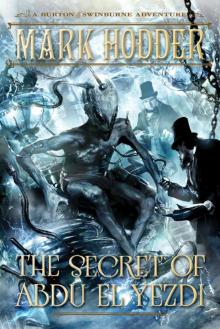 The Secret of Abdu El Yezdi
The Secret of Abdu El Yezdi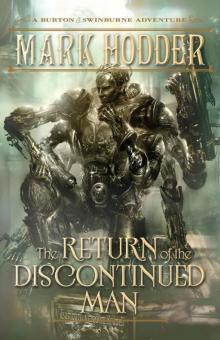 The Return of the Discontinued Man
The Return of the Discontinued Man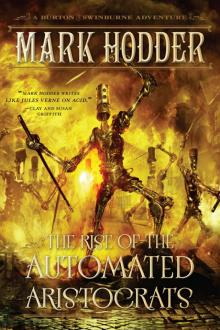 The Rise of the Automated Aristocrats
The Rise of the Automated Aristocrats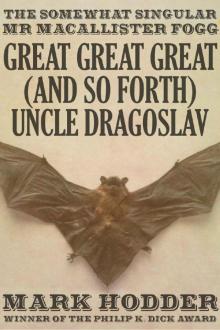 Macallister Fogg 2: Great Great Great (And So Forth) Uncle Dragoslav
Macallister Fogg 2: Great Great Great (And So Forth) Uncle Dragoslav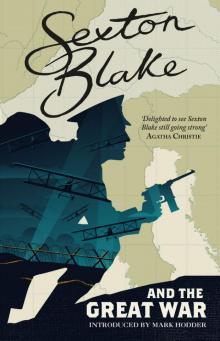 Sexton Blake and the Great War
Sexton Blake and the Great War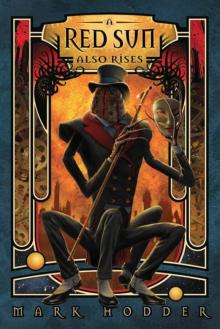 A Red Sun Also Rises
A Red Sun Also Rises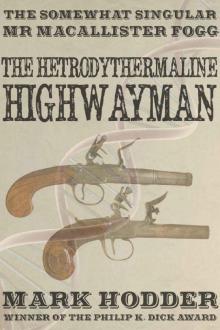 Macallister Fogg 3: The Hetrodythermaline Highwayman
Macallister Fogg 3: The Hetrodythermaline Highwayman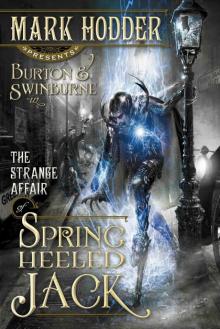 The Strange Affair of Spring Heeled Jack
The Strange Affair of Spring Heeled Jack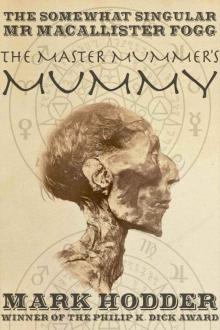 Macallister Fogg 1: The Master Mummer's Mummy (The Adventures of Macallister Fogg)
Macallister Fogg 1: The Master Mummer's Mummy (The Adventures of Macallister Fogg)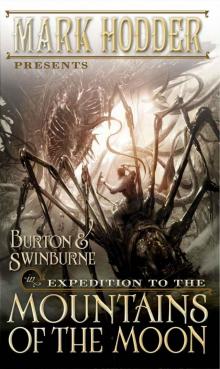 Expedition to the Mountains of the Moon bas-3
Expedition to the Mountains of the Moon bas-3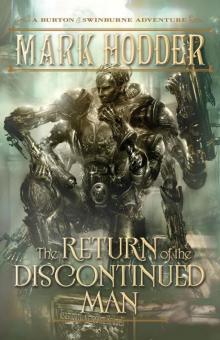 The Return of the Discontinued Man (A Burton & Swinburne Adventure)
The Return of the Discontinued Man (A Burton & Swinburne Adventure)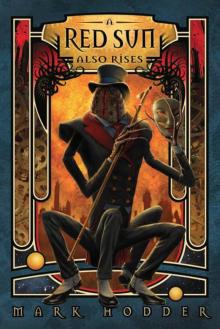 Red Sun Also Rises, A
Red Sun Also Rises, A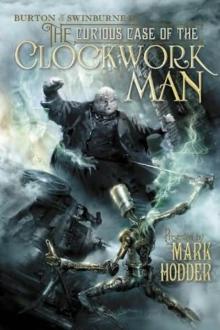 The curious case of the Clockwork Man bas-2
The curious case of the Clockwork Man bas-2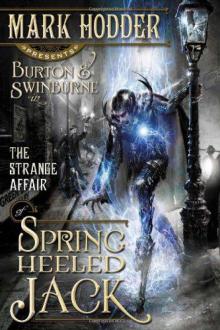 The strange affair of Spring-heeled Jack bas-1
The strange affair of Spring-heeled Jack bas-1